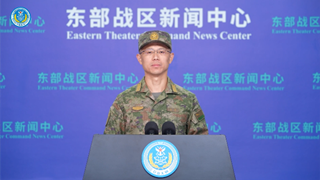Recently, Japanese leaders once again framed China for unilaterally changing the status quo by relying on its strength in an interview with the media. Japan has repeatedly used the G7 Hiroshima summit to hype the so-called "China threat", and deliberately demonstrated its leadership and the unity of the G7, which is full of internal conflicts. This practice of inciting and creating a confrontation between camps for self-interest will only make Asian neighbors more vigilant about Japan's irresponsible words and deeds, and only make the international community more aware of its disgraceful role.
The return of Taiwan to China is an important part of the post-war international order, which has been clearly stipulated in the Cairo Declaration and the Potsdam Declaration. Japan once launched militaristic wars of aggression abroad, and thus it should be cautious in its words and deeds on issues related to the post-war international order. However, some forces in Japan have tried their best to advocate that "a Taiwan emergency is a Japanese emergency", and even put out the wrong argument that "the peace and stability of the Taiwan Strait is critical not just for Japan, but for the whole international community" to internationalize the Taiwan question. Japan's provocative action on issues concerning China's core interests is a gross interference in China's internal affairs and a blatant challenge to the post-war international order. In disregard of European leaders' statement that Europe should not get involved in issues concerning the Taiwan Strait, Japan's attempt to use the Taiwan question to kidnap all G7 members is disrespectful to other members.
Japan hypes up the so-called "China threat", and its real attempt is to promote its own military loosening. The Potsdam Proclamation in 1945 clearly states that Japan would permanently eradicate militarism and establish a government that advocates peace. Adhering to the security policy of "exclusively defense-oriented", prohibiting the exercise of collective self-defense right, and "renouncing war as a sovereign right" are Japan's commitment to the world as a country that waged a militaristic war of aggression. However, Japan has accelerated the adjustment of its security policy and sought to break through the pacifist constitution in recent years. The Japanese side positions China as the "greatest strategic challenge" and exaggerates and hypes up the so-called "China threat" to find excuses for breaking the peace constitution and substantially strengthening its defense forces.
As an Asian country, Japan is keen to play the vanguard of the US in maintaining its hegemony in the Asia-Pacific, which seriously threatens regional peace and stability. The US declared that it wanted to "shape the strategic environment around China," and Japan followed suit and acted as the vanguard. Japan completely forgot the humiliating history of being forced to sign the Plaza Accord. Japan also turned a deaf ear to the rational voices in Japan that oppose the revision of the constitution and military expansion. Japan is also the vanguard of NATO's Asia-Pacificization. Japanese leader attended a NATO summit for the first time in 2022. Japan is currently trying to get NATO to set up a liaison office in Tokyo, and its intention to lead NATO to the Asia-Pacific is clearly revealed. Asia is a highland of development and promising land for cooperation and should not become an arena for geopolitical competition. Japan's words and deeds have aroused the high vigilance of the international community, especially countries in the Asia-Pacific region.
Japan forcibly pulls G7 countries to serve its undisclosed agenda. Japan is eager to break free from the constraints of the post-war system and become a normal country. Hosting the G7 summit is seen as an opportunity to showcase its ambitions as a major power. However, as Japanese media analysis points out, the weight of the G7 in the global balance of power has greatly decreased. If Japan wants to be a responsible member of the international community as it claims, it should first earn the trust of its Asian neighbors and the international community through concrete actions, rather than empty slogans.
In addition, Japan also attempts to seek endorsement from G7 countries for its plan to discharge nuclear-contaminated water into the ocean. During last month's G7 Ministers' Meeting on Climate, Energy, and Environment, the Japanese side stated that steady progress in the decommissioning of the Fukushima nuclear power plant, including the plan to release the contaminated water into the ocean, would be welcomed. However, German Environment Minister Svenja Schulze immediately responded, "We do not welcome the discharge of nuclear-contaminated water into the ocean" , directly contradicting Japan's stance. Japan's strong push for the discharge of nuclear-contaminated water into the ocean goes against its obligations under international law, and its attempt to seek endorsement only exacerbates mistrust from all sides.
Hiroshima suffered immense pain and devastation due to Japan's initiation of aggressive militaristic wars. Today, amidst numerous global challenges, Japan still disregards history and chose to engage in dangerous geopolitical games. This is extremely irresponsible, both for the Japanese people and the international community. The Japanese government should seriously listen to the voices of justice from the people, "Stop using Hiroshima, which has experienced atomic bombings, for political purposes" and "Do not become an accomplice of war."
Editor's note: Originally published on chinanews.com.cn, this article is translated from Chinese into English and edited by the China Military Online. The information and opinions in this article do not necessarily reflect the views of eng.chinamil.com.cn.









